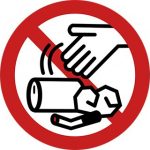The Offences, Defences and Penalties for Improperly Discarding a Cigarette in NSW

Smoking cigarettes is a simple pleasure for many, but being reckless with your butts, or worse, a lit cigarette can result in hefty fines and even land you before a court.
The following outlines the potential offences and penalties that relate to improperly discarding cigarettes, including the general offence of littering and the more serious offence of discarding a lighted cigarette, as well the potential defences that apply.
The offence of littering
The general offence of littering is contained in section 145 of the Protection of the Environment Operations Act 1997 (NSW).
This offence applies when a person deposits litter in or on a public place or an open private place. Litter includes cigarettes and cigarette butts.
A ‘public place’ is defined as a place that is open to the public, or is used by the public, whether or not on payment of money or other consideration, whether or not the place is ordinarily so open or used, and whether or not the public to whom the place is so open, or by whom the place is so used, consists only of a limited class of persons.
This offence of littering currently carries an on-the-spot fine of $250, or a maximum fine of $2,200 if the matter goes to court.
Subsection 145(3) of the Act makes clear that a person is not guilty if the litter was:
- placed in a receptacle provided by the custodian of the place for the depositing of litter, and
- in accordance with any conditions specified by the custodian, by means of a notice displayed on or in the vicinity of the receptacle, in relation to the depositing of litter in the receptacle, or
- placed a receptacle containing the litter in the place for the purpose of the litter being removed in the course of a litter removal service provided by the custodian of the place, or
- deposited the litter in the place:
- in response to an invitation contained in a notice published by the custodian of the place, and
- in accordance with any conditions specified in the notice in relation to the depositing of litter in that place, or
- deposited the litter in the place with the express consent of the custodian of the place.
- deposited the litter in the place under an authority conferred by or under this or any other Act or any Commonwealth Act, or
- deposited the litter in accordance with any regulations made for the purposes of this section or in such circumstances as may be prescribed by any regulations made for the purposes of this section.
An aggravated form of this offence exists under section 145A of the Act if, at the time of littering a person:
- caused or contributed to appreciable danger or harm to any persons, animals, premises or property, or
- was reasonably likely to cause or contribute to such danger or harm (whether or not any such danger or harm was actually caused), because of the volume or kind of litter deposited, or the manner in which it was deposited, or the place in or on which it was deposited.
Aggravated littering carries a maximum penalty of a fine of $3,300 for individuals or $5,500 for corporations.
The offence of discarding a lighted cigarette
A more serious offence is outlined under section 99A of the Rural Fires Act 1997 (NSW), related to discarding a lighted cigarette on any land.
This offence carries an on-the-spot fine of $660 when not a Total Fire Ban or $1320 during a Total Fire Ban. If the matter goes to court the maximum penalties include $5,500 if not during a Total Fire Ban or $11,000 during a Total Fire Ban.
If the lighted cigarette is discarded from a vehicle, the driver of the vehicle will also incur 5 demerit point, which doubles to 10 demerit points during a Total Fire Ban.
The driver of a vehicle can be fined for a discarded cigarette even if a passenger was the one to discard the cigarette.
Defences to cigarette offences
To convict someone of a discarded cigarette offence, the prosecution needs to be able to prove beyond reasonable doubt that the defendant discarded the cigarette.
Formal legal defences to offences could include duress and necessity.
Duress is where your conduct arose due to an imminent threat made to you or someone close to you, in circumstances where the threat was continuing and serious enough to justify your actions.
Necessity is where you engaged in your actions to avoid serious, irreversible consequences to you or someone you were bound to protect, you honestly and reasonably believed you or the other person were immediate danger and your actions were a reasonable and proportionate response to the danger.
Going to court?
If you are going to court for a cigarette-related offence , call Sydney Criminal Lawyers® anytime on (02) 9261 8881 to arrange a free first conference with an experienced criminal defence lawyer, who will take the time to advise you of your options, the best path forward and the costs involved, and fight for the best possible outcome.






